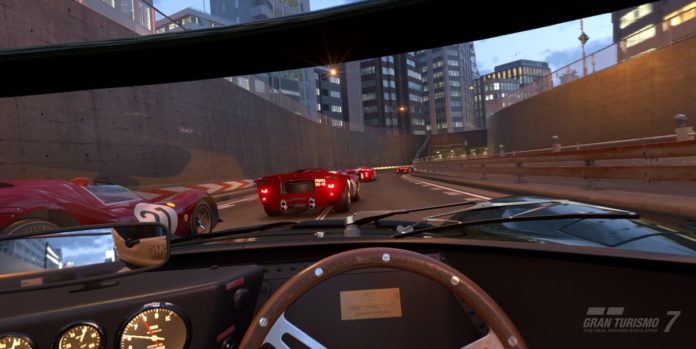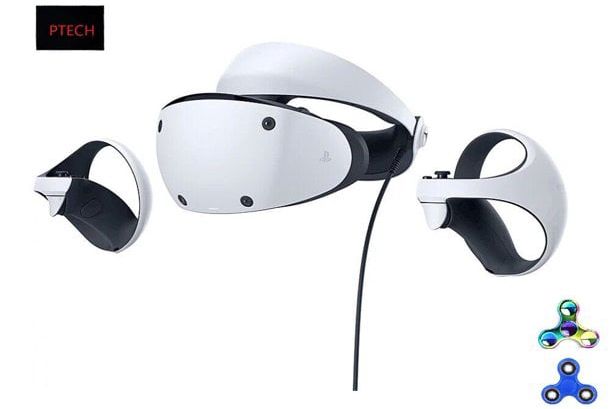- We tried it, and we can categorically state that Gran Turismo 7 on PlayStation 5 is a whole new experience when you add Sony’s new PS VR2 headset.
- The new virtual reality headset uses a high-resolution OLED display compatible with 4K HDR games at up to 120 frames per second.
- Available exclusively for the Sony PlayStation 5, the PS VR2 headset with its two VR2 sense controllers will set you back $549.
The floor space of Toyota’s GR010 Hybrid Le Mans Hypercar is awash with computers, wiring harnesses, and carbon-fiber bodywork all neatly packed by an assortment of stainless-steel fasteners. Until recently, the handy work by Toyota Gaz0o Racing engineers required a stint with the race team, but we’re having a look from the living room couch. Using Sony’s all-new PS VR2 headset, these finer details shine bright enough to make you squint. The PlayStation 5 virtual reality experience isn’t just a new toy it makes Gran Turismo 7, the company’s exclusive driving sim, feel brand-new all over again.
The PS VR2 virtual reality headset is a profound pair of goggles. It’s a wired unit that’s only compatible with the PlayStation 5. It uses a high-resolution OLED display for each eye that illustrates compatible video games in 4K HDR at up to 120 frames per second. The headset even tracks eye movement to simulate how we focus in the real world. When experiencing this in Gran Turismo 7, it means when your eyeballs are pointed at the braking zone marker, the sharpness intensifies in one specific spot and feathers away from what you’re looking at. Can’t see the rearview camera because your knuckles are in the way? No problem, pick your chin up to look around them. The game’s level of detail adjusts on the fly instead of painting all of it at once across a television screen.
The headset weighs just over a pound, which is much lighter than even the most expensive carbon-fiber lightweight racing helmet. While the PS VR2 only covers your eyes and forehead, the way the hardware locks you into a vision-canceling aura is similar to what it’s like peering out of something Snell certified. Drive across the curbing of Inner Loop at Watkins Glen, and the headset’s vibration deepens the illusion. There’s even plenty of room in the viewing area to accommodate prescription eyeglasses.
The magic of playing Gran Turismo 7 while wearing the PS VR2 is that everything becomes a three-dimensional experience. Whether you’re competing online against real people, attempting to complete license challenges, watching replays, or taking a tour of every car at the dealership, the entire game is all up in your face.
Mountain Dew-flavored Dramamine
Exploring the supremely detailed interiors that Polyphony Digital has developed for Sony’s driving sim is like seeing color television for the first time. You can’t help but let out an audible “oh my God” and quickly forget what Gran Turismo 7 was like without it. It’s seriously that good. The change of perspective while wearing the PS VR2 headset is major. It’s a lot of fun but doesn’t feel like playing a game; it feels exceptionally real.
A word of caution: sometimes things can get a little too real, so take it slow. Especially if you’re new to VR. Don’t put the headset on and expect to stomach an hour of intense driving at the Nürburgring in a GT3 race car. We tried that, paying the price of nearly revisiting our Taco Bell lunch. Polyphony Digital CEO Kazunori Yamauchi suggests starting slow and in a convertible. Saying in an interview to just drive normally and build up your tolerance in stints, just as you would out on a real race track for the first time. Although even when we were warmed up after hours of gameplay, the elevation change and vehicle movement during rally races had us pausing to take a break. 15 minutes later, we sat back down and finished the race without the worry of experiencing Return of the Cheesy Gordita Crunch.
Many Pennies, But Worth It
For our experience with the PS VR2 headset and Gran Turismo 7, we used the PS5 DualSense controller instead of a racing wheel. The two VR2 Sense controllers that are necessary in other VR games, aren’t apart of the Gran Turismo 7 experience. The PS5 DualSense does its best to imitate brake fade and pedal feel through adaptive triggers and haptic feedback. Even without a racing wheel, we’d argue the dynamic perspective helped us improve our lap times. The combination of the force feedback in the PS VR2 headset with the PS5 DualSense adaptive triggers is a gift to gamers without the money or space to park a bucket seat and steering wheel in their living room.
This heightened sense of simulation doesn’t come cheap. The PS VR2 currently retails for $549. That’s $150 more than the PlayStation 5 console required to use it, or $50 more if you purchase the more expensive PS5 that comes with a disc drive. Buying a bundle could add hundreds to that price. If watching that much money go toward video games gives you motion sickness, we should point out it’s a cheaper alternative to a sim rig that uses a direct-drive steering wheel and pedals. Another neat trick with the PS VR2 headset; you aren’t required to face the television, even if you’re using a full-on rig. Just create a play space as far as the headset’s 14.7-foot cord will reach and get racing.
Incredible Hardware with Few Choices
The PS VR2 headset isn’t the first VR experience in the competitive world of sim racing, but it’s a first for the Gran Turismo series. Popular racing games such as Assetto Corsa, Assetto Corsa Competizione, iRacing, rFactor, and Dirt Rally 2.0 unlocked virtual reality long before Sony’s new hardware launched earlier this year. Those racing sims, each have their own range of virtual reality headset options, much of which takes place on PC instead.
Sony’s library of PS VR2 compatible games, outside of our own obvious favorite, still leaves a lot to be desired. Horizon: Call of the Mountain takes full advantage of the headset OLED screens with beautifully-rendered environments in an action-packed story. The space explorer No Man’s Sky is a different adventure worth checking out, one that delivers clever use of the headset and controller’s haptic feedback. For now, we’ve got more car interiors to explore in 4K.
This content is imported from poll. You may be able to find the same content in another format, or you may be able to find more information, at their web site.
Associate Editor
Yes, he’s still working on the 1986 Nissan 300ZX Turbo project car he started in high school, and no, it’s not for sale yet. Austin Irwin was born and raised in Michigan, and, despite getting shelled by hockey pucks during a not-so-successful goaltending career through high school and college, still has all of his teeth. He loves cars from the 1980s and Bleu, his Great Pyrenees, and is an active member of the Buffalo Wild Wings community. When Austin isn’t working on his own cars, he’s likely on the side of the highway helping someone else fix theirs.




